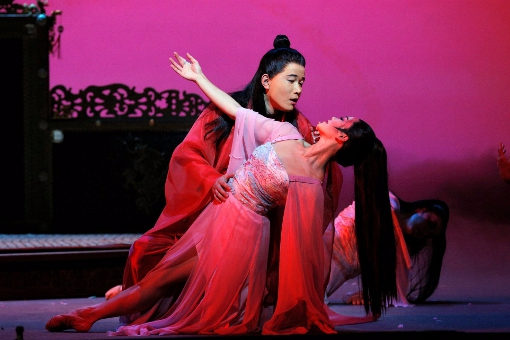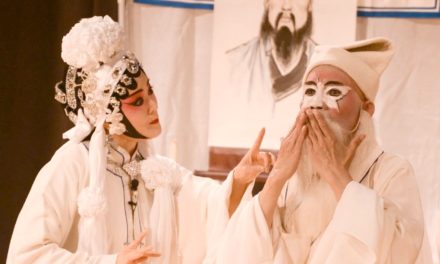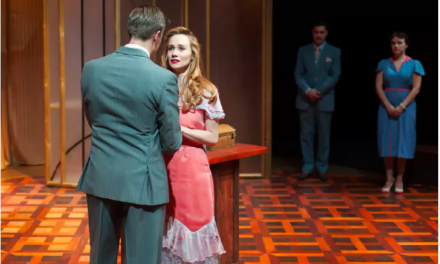When Amanda Li steps onto the stage in the classic Dream of the Red Chamber, she’ll do so having had just a week or two of active rehearsal. Not that Li hasn’t prepared for the San Francisco Opera production, which took the stage in Hong Kong on March 17 and 18, 2017.
Hong Kong-born Li is currently wrapping up a doctorate degree in singing in Bloomington, Indiana. Since flying in to audition for the role, Li has been in regular contact with MacArthur Fellow Bright Sheng, the opera’s musical composer. Sheng’s production premiered last September in San Francisco, but a lead character could not make the run in Hong Kong, and the role needed recasting. Li’s was among a few suggestions made by the Hong Kong Art’s Festival organizers, who co-produced the piece. After auditioning, she flew straight back to Indiana to continue her studies, and has since been learning the parts and working on her vocals using taped rehearsals.
The opera is based on one of China’s best-known stories, which is deemed one of the country’s four great classical novels (the others three being Water Margin, Romance of the Three Kingdoms, and Journey to the West). The Dream of the Red Chamber tells the semi-autobiographical story of a noble family’s fall from grace and was written in the 1750s by the writer Cao Xueqin. Imbued with intricate observations of the life and times of Chinese life and custom during the Qing Dynasty (1644-1911), Red Chamber is also what Li calls a “bonfire of drama.”
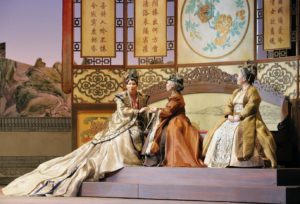
Scene from Dream of the Red Chamber – San Francisco Opera
Li says that people today look down on soap operas, but in many ways, Red Chamber is the 18th-century equivalent, full of money, lust, deceit and betrayal. In the English-language opera’s two-act version, the story centers on a tragic love triangle between the main male lead, Bao Yu, a rich young man with artistic leanings but little talent, who dotes on poetry, architecture, and art. His soul mate is the aristocratic and brilliantly skilled artist cousin Dai Yu, but his betrothed is Bao Chai, a distant cousin but the well-connected daughter of a wealthy merchant. She is played by Li.
Although the original novel is a few hundred years old, this particular opera is a brand new work and a huge undertaking. Inside China, it is well-loved and well-known, although in the West not many have read it – including David Henry Hwang, the award-winning Chinese-American playwright charged with taking the book’s 2,500 pages and 700 characters down to a two-act opera accessible for those who love the novel as well as those who are unfamiliar.
The completely original staging and music is exciting, but it also poses significant challenges for the performers. “The difficulty with learning new music like this is that there are no recordings to go from,” says Li. In rehearsals, the cast had to work with a pared-back piano score. “You can never quite imagine what the full sound will be like,” says Li.
That’s not to say the 34-year-old singer isn’t used to a challenge. Her journey to a starring role in Red Lantern has had its own dramatic twists and turns. The story began when Li’s mother enrolled her young daughter, age six, in piano lessons that Li begged to stop just a few years later. Her mother advised her that by giving up at that point, all previous effort would have been a waste. She encouraged her to keep going. Li played piano until Grade 8 and then, having sufficiently proved herself, gets her mother’s permission to end the classes.
By then, Li was 15 years old, but she hadn’t entirely given up on music. In fact, just the opposite: adopting her mum’s powers of persuasion, she requested that the money previously used to fund piano lessons now be put towards her true passion, singing. She hunted for a teacher.
After studying music at Hong Kong’s Chinese University, Li left for England at the age of 22 for a master’s degree at the University of London, and she later studied at the prestigious Royal Northern College of Music, performing in recitals in Hong Kong, England, and Europe. But then what would be a standard routine operation for most people threatened to thwart her burgeoning career: Li discovered that her tonsils needed taking out.
“They are rather large,” the singer says today, with a matter-of-fact smile. She folds her fingers to form two circles the size of golf balls. Naturally protective of any surgery around her vocal chords, she put off the operation. But the tonsils were taking up vital sound-making space that she needed to develop. She realized that if she wanted to pursue a vocal career she would have to fight the fears she had about losing her voice and get them removed.
When she left the hospital, she discovered a new resolve to keep singing. “I said to myself, ‘Well, I didn’t die and my voice seems okay. I have to sing.” After four years teaching in Hong Kong, she left for Indiana University to get a doctorate degree from the renowned Jacobs School of Music.
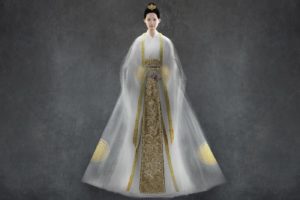
Costume design for Bao Chai – San Francisco Opera
She was delighted to receive the call from Bright Sheng. To be returning to Hong Kong for her first major role in such an expensive and elaborate production is an honour, she says. But she has an added reason to feel excited. The opera’s run happens to coincide with her father’s 60th birthday – a fortuitous coincidence. “I’m really very lucky,” she says.
Li, who grew up in Shatin and comes from a non-musical background, says she misses Hong Kong’s cultural diversity, and the respect people here have for arts like opera, but has promised herself that she will go where opportunity knocks. At the moment that opportunity happens to be found in the United States, which means Li sees her family just once a year.
She still loves to play and sing, and performs and teaches to support herself. She could have stayed in Hong Kong to teach, she says, which would have been comfortable. “And right now, I’m nowhere near comfortable,” she admits. Luckily her soprano voice — which is darker and deeper than a lighter soprano — puts age on her side, and should enable her to enjoy a longer career by playing older characters. But in a sector as uncertain as the arts there are no guarantees. Like Bao Chai, she’s anxious to get on and make her mark. “I’ll try,” she says. “I’ll try. You never know with arts. A lot of my friends are waiting tables.”
Li shares the blend of ambition and pragmatism with her character in the opera. Bao Chai, she says, is “new money,” and is unwanted by Bao Yu. But she’s determined, with something to prove to him, to society and to herself. Like Bao Chai, she isn’t easily fazed. “I’m very much like her. If there is a problem, I’ll say, ‘Let’s solve it,’” she says.
Li likes emotive pieces like Dream of the Red Chamber because she is “quite melodramatic,” she says. “I like anything that makes me cry, and Red Chamber did.” She dreams of one day playing in Tosca and Madame Butterfly, and her ultimate part would be Elisabeth from Richard Wagner’s Tannhäuser. “Wagner wrote his own libretti, often combining myths and German folklores, and in his operas, one sees his wonderful ability to bring out the various shades and depths of love in its many forms, from the darkest to the most glorious,” she says. “Singing his music is truly an experience of a true transcendence of time and culture. I told my boyfriend that if I get to play her then I can die right there.”
Dream of the Red Chamber was part of the Hong Kong Art Festival. Performances that took place on March 17 and 18, 2017.
This post was written by the author in their personal capacity.The opinions expressed in this article are the author’s own and do not reflect the view of The Theatre Times, their staff or collaborators.
This post was written by Zolima CityMag.
The views expressed here belong to the author and do not necessarily reflect our views and opinions.

